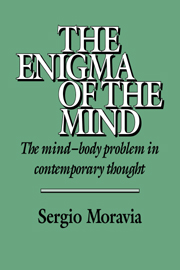Book contents
- Frontmatter
- Contents
- Preface to the English edition
- The enigma of the mind
- The enigma of the mind: Introduction to a metaphor
- 1 Toward a physical science of the mental: Feigl and the (re-)construction of the ‘mind–body problem’
- 2 The apogee of physicalism: The identity theory and materialism in the Australian school
- 3 The obscure relationship: Problems and debates surrounding the identity theory
- 4 Psychology as alchemy: The elimination of the mental in the ‘disappearance theory’
- 5 The mind as function: The functionalist approach to the mind–body problem
- 6 The mind as property and as event: The ‘reformist’ neo-identityism of Kim and Davidson
- 7 The mind as language: The linguistic turn in the mind–body problem
- 8 Speaking in many different ways: The pluralization of descriptions and explanations in the MBP
- 9 The mind as a mode of subjective experience: An interpretive model of the features of the mental
- 10 The mind as ‘subject’ and as ‘being-in-the-world’: Toward a non-mentalistic interpretation of the mental
- Appendix The mental as intentional/‘personal’ emergence: The psycho-personological perspective of Joseph Margolis
- Bibliography
- Name index
5 - The mind as function: The functionalist approach to the mind–body problem
Published online by Cambridge University Press: 05 June 2012
- Frontmatter
- Contents
- Preface to the English edition
- The enigma of the mind
- The enigma of the mind: Introduction to a metaphor
- 1 Toward a physical science of the mental: Feigl and the (re-)construction of the ‘mind–body problem’
- 2 The apogee of physicalism: The identity theory and materialism in the Australian school
- 3 The obscure relationship: Problems and debates surrounding the identity theory
- 4 Psychology as alchemy: The elimination of the mental in the ‘disappearance theory’
- 5 The mind as function: The functionalist approach to the mind–body problem
- 6 The mind as property and as event: The ‘reformist’ neo-identityism of Kim and Davidson
- 7 The mind as language: The linguistic turn in the mind–body problem
- 8 Speaking in many different ways: The pluralization of descriptions and explanations in the MBP
- 9 The mind as a mode of subjective experience: An interpretive model of the features of the mental
- 10 The mind as ‘subject’ and as ‘being-in-the-world’: Toward a non-mentalistic interpretation of the mental
- Appendix The mental as intentional/‘personal’ emergence: The psycho-personological perspective of Joseph Margolis
- Bibliography
- Name index
Summary
PUTNAM: THE ATTACK ON MATERIALISM AND PHYSICALISM
In the debate engaging the contemporary philosophy of mind the functionalist movement has proved to be an extremely lively, complex, and epistemologically formidable contender. Functionalism has addressed themes and issues of crucial importance to the mindbody relationship: the nature of mental states, the structure of psychological explanation, the possible autonomy of psychology as a science, and the problems of reduction and nomology in psychological analysis. Its investigation covers epistemological and (meta)psychological terrain and is carried out on different levels at once. We shall limit ourselves, however, to examining certain theoretical points of particular pertinence to our present concerns and to consider two philosophers who have emerged from a variety of currents as the foremost champions of functionalism: Hilary Putnam and Jerry Fodor.
The most striking quality of the output of Putnam and Fodor is the theoretical breadth. Unlike many mbp specialists, neither Fodor nor much less Putnam (whose foreground role in contemporary philosophy scarcely needs underscoring) confines himself to a ‘technical’ approach to the question of the relationship between mind and body. On the contrary, both carry out their investigations within a much broader context and assume clear positions on the far-reaching psychoanthropological and epistemological implications of the problem. Not surprisingly, then, Putnam and Fodor take determined stands on issues of general concern to philosophy such as materialism, physicalism, and reductionism.
- Type
- Chapter
- Information
- The Enigma of the MindThe Mind-Body Problem in Contemporary Thought, pp. 130 - 152Publisher: Cambridge University PressPrint publication year: 1995



